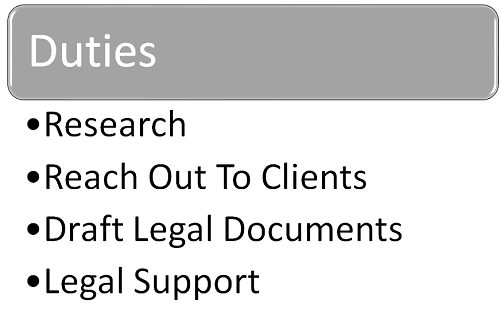In law firms, corporate legal departments and other legal services environments, paralegals are the ones responsible for important tasks delegated to them by attorneys. These tasks can include what the American Bar Association refers to as “substantive legal work,” although other job duties relate more to working with clients and administrative responsibilities.
Research Responsibilities
Work in the legal arena requires plenty of research on a number of different fronts. Legal research is a big part of a paralegal’s job duties. Each day, you can expect to examine the laws and regulations related to the legal matter on which you are working. You may find and read legal articles that describe the evolution of case law and court decisions to help the attorneys with whom you work to make critical decisions about how to approach representing a client.
Your research responsibilities aren’t limited only to dense legal documents. You may also be responsible for investigating the matter at hand, whether it relates to criminal charges, an accident, contractual matters or another situation. Through your investigation, you will gather the evidence and data the attorney will use in legal arguments.
In modern legal matters, many files are stored electronically, which makes paralegals with skills in database management and other computer proficiencies particularly sought after, the United States Bureau of Labor Statistics (BLS) reported.
Client Contact
Interactions with clients are often, but not always, part of a paralegal’s job duties. Just how extensive your contact with clients is will depend on the law firm for which you work. In some firms, paralegals are the front-line communicators with clients. They may reach out to clients periodically to update them on their case. Although paralegals’ work is fast-paced and stressful at times, they are often better able to respond promptly to client questions than attorneys, who could be tied up for long periods of time in legal proceedings.
On the other hand, the American Bar Association noted, some paralegals have far less extensive client contact demands. Paralegal supervisor roles, in which you would oversee the work of other paralegals, may include less direct client contact.
Drafting Legal Documents
The practice of law involves the creation of numerous types of legal documents, from subpoenas to legal briefs. What you probably don’t know is that these complex documents are often written not by attorneys but, instead, by paralegals.
Learning to draft these documents that are full of technical legal jargon, often referred to as “legalese,” can be a challenge. That’s why many paralegal studies programs, even those offered at the associate’s degree level, include studies in legal writing. Legal writing skills are among the core competencies established by the American Association for Paralegal Education.
Legal writing skills include learning how to draft different types of documents using the proper format and write about legal theory in a style that is succinct and unambiguous.
Support in the Courtroom
Much of a paralegal’s work revolves around preparing a case for resolution, from its earliest stages through its completion. At times, however, paralegals go into the courtroom, where they provide support in different capacities. In a trial, a paralegal may be called on to keep track of and produce evidence exhibits or to take notes of what occurs for further tailoring of legal strategy, the BLS reported.
Many paralegals are involved in filing court documents and scheduling court proceedings. Litigation paralegals are more likely to have job duties that extend to coordinating logistics and handling evidence and equipment in court.
Paralegal Job Duties by Legal Specialization
Like attorneys, paralegals can specialize in an area of law that most interests them. Which area of legal practice you choose will impact what your typical day looks like. Naturally, the research, writing and nature of court proceedings are different for each type of legal matter. The contracts you oversee in corporate law or real estate law differ not only from each other but also from the insurance policies and settlement demand letters common in personal injury law. Handling criminal matters is different in many ways from handling civil matters.
Whether you represent the plaintiff or the defendant is another factor that affects what your job duties entail and what you do in an “average” day.
Additional Resources
What Is the Difference Between Paralegal and Legal Assistant?

